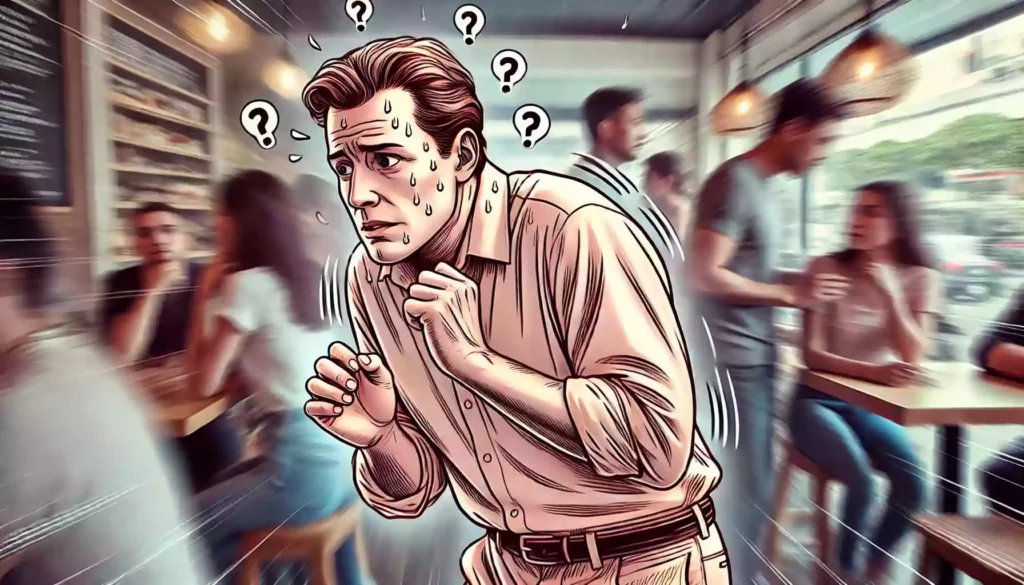Key Takeaways:
- Understanding hypervigilance
- Daily life impact
- Recognizing common triggers
- Coping strategies
- Seeking professional help
What is Hypervigilance?
Hypervigilance is a state of heightened alertness and sensitivity to your surroundings. It's often a response to trauma or a perceived threat, making you constantly on the lookout for danger. This condition is more than just being cautious—it's an intense, persistent feeling of being on edge, as if something bad is about to happen at any moment.
Understanding hypervigilance requires recognizing its roots in anxiety and stress. The brain's fight-or-flight response is continuously activated, even when there is no immediate danger. This can lead to physical symptoms such as increased heart rate, sweating, and a constant sense of dread.
According to Dr. Bessel van der Kolk, author of "The Body Keeps the Score," "Traumatized people chronically feel unsafe inside their bodies: The past is alive in the form of gnawing interior discomfort." This quote highlights how deeply hypervigilance can affect your internal state.
The Impact of Hypervigilance on Daily Life
Living with hypervigilance significantly impacts your daily life. You might find it challenging to relax, even in safe environments. Simple tasks become daunting because you're always expecting the worst. This constant state of alertness drains your energy and affects your ability to focus on routine activities.
Social interactions can also suffer. Hypervigilance makes it hard to trust others, leading to strained relationships. You might come across as distant or overly cautious, which can be misunderstood by friends and family. It's not just about being wary—it's about being consumed by the need to protect yourself from potential threats, real or imagined.
Work life doesn't escape the effects either. Concentration issues and fatigue make it difficult to maintain productivity. Deadlines feel like mountains to climb, and stress levels remain perpetually high. The cycle of anxiety and vigilance can be relentless, leaving you feeling exhausted and overwhelmed.
Common Triggers of Hypervigilance

Hypervigilance can be triggered by a variety of factors, often linked to past traumatic experiences. Loud noises, sudden movements, or even certain smells can set off this heightened state of alertness. These triggers are deeply embedded in your subconscious, making you react instinctively and sometimes irrationally to perceived threats.
Environments that remind you of past trauma can also be powerful triggers. For instance, if you've experienced a traumatic event in a particular setting, returning to a similar environment can instantly heighten your vigilance. This connection between place and memory creates a constant state of unease, where your mind is always on guard.
Interactions with certain individuals or groups can also trigger hypervigilance. People who resemble or remind you of someone from a traumatic event can cause anxiety and wariness. This social aspect of hypervigilance complicates relationships, as you may struggle to separate past experiences from present realities.
Hypervigilance vs. General Anxiety
While hypervigilance and general anxiety share similarities, they are distinct conditions. Hypervigilance is specifically characterized by an exaggerated state of alertness and a focus on potential threats. In contrast, general anxiety is a broader feeling of worry or fear that isn't always linked to specific triggers.
Dr. Judith Herman, in her book "Trauma and Recovery," notes that "Hypervigilance, the constant scanning of the environment for threats, is a hallmark of post-traumatic stress disorder." This quote underscores how hypervigilance is a more acute and focused form of anxiety, often tied to trauma.
General anxiety can manifest as persistent worrying about various aspects of life, such as work, health, or relationships. It's more about an overall sense of unease rather than a concentrated focus on potential dangers. People with general anxiety might not have the same heightened sensitivity to their surroundings as those with hypervigilance.
Understanding the difference between these two conditions is crucial for effective treatment. While both can be debilitating, the approaches to managing them can differ significantly. Hypervigilance often requires strategies that specifically address the trauma and the resultant state of alertness, whereas general anxiety might be managed with broader techniques such as mindfulness and cognitive-behavioral therapy.
7 Shocking Signs of Hypervigilance

Hypervigilance manifests in various ways, often affecting different aspects of your life. Recognizing these signs can help you understand the extent of your heightened alertness.
- Constant Scanning: Always checking your surroundings, expecting danger at every turn.
- Exaggerated Startle Response: Jumping or reacting intensely to sudden noises or movements.
- Insomnia: Struggling to fall or stay asleep due to a racing mind.
- Hyper-awareness of Sounds: Noticing and reacting to even the faintest noises.
- Avoidance Behavior: Steering clear of places or situations that might trigger anxiety.
- Physical Tension: Feeling constantly tense, with muscles ready to react.
- Paranoia: Believing others are out to get you, even without evidence.
Each of these signs can severely impact your quality of life, making everyday activities feel like a constant battle against an unseen enemy.
How Hypervigilance Affects Relationships
Hypervigilance doesn't just affect you; it also impacts those around you, particularly in your close relationships. Trust issues are common, as you might find it difficult to let your guard down, even with loved ones. This constant state of alertness can be misunderstood as distrust or emotional distance, causing friction in your relationships.
Partners and friends might feel hurt or confused by your behavior. They may not understand why you're always on edge or why you react so intensely to seemingly minor stimuli. This can lead to a lack of communication and emotional connection, which are crucial for healthy relationships.
Dr. Gabor Maté, a renowned physician and author, explains in his book "When the Body Says No," that "hypervigilance is a protective mechanism, but it can create barriers to intimacy and connection." This quote emphasizes how hypervigilance, while intended to protect, can inadvertently harm your relationships by keeping others at a distance.
Moreover, your hyper-awareness can lead to overprotection of loved ones, making them feel suffocated or controlled. Balancing your need for safety with their need for autonomy is a delicate dance that requires understanding and open communication.
Ultimately, addressing hypervigilance through therapy and coping strategies can not only improve your mental health but also strengthen your relationships. By working on reducing your heightened alertness, you can create a more relaxed and trusting environment for yourself and those you care about.
Effective Coping Strategies
Managing hypervigilance requires a combination of self-awareness and practical strategies. One of the most effective ways to cope is through mindfulness techniques. Mindfulness helps you stay grounded in the present moment, reducing the intensity of your reactions to perceived threats. Practices such as deep breathing, meditation, and grounding exercises can significantly calm your mind and body.
Another useful strategy is cognitive-behavioral therapy (CBT). CBT helps you identify and challenge the negative thought patterns that fuel hypervigilance. By recognizing these thoughts and replacing them with more rational ones, you can reduce your overall anxiety and improve your reaction to stressors.
Regular physical activity is also beneficial. Exercise releases endorphins, which are natural mood lifters, and helps reduce the physical symptoms of anxiety. Activities like yoga, walking, or even dancing can provide a much-needed outlet for your stress.
Journaling can be a powerful tool as well. Writing down your thoughts and feelings allows you to process them more effectively and can reveal patterns in your triggers and responses. This self-reflection can be a stepping stone to better managing your hypervigilance.
Lastly, don't underestimate the power of support networks. Talking to trusted friends or family members about your experiences can provide emotional relief and practical advice. Joining a support group, either in person or online, can connect you with others who understand what you're going through and offer additional coping strategies.
When to Seek Professional Help
While self-help strategies are valuable, there are times when professional help is necessary. If hypervigilance significantly impacts your daily life and relationships, it's crucial to reach out to a mental health professional. Persistent and overwhelming anxiety that you can't manage on your own is a clear sign that you need additional support.
Therapists, particularly those specializing in trauma and anxiety disorders, can provide targeted interventions that address the root causes of hypervigilance. Treatments such as eye movement desensitization and reprocessing (EMDR) and exposure therapy have been proven effective in reducing symptoms.
In some cases, medication might be recommended to help manage severe anxiety. Antidepressants or anti-anxiety medications can be prescribed by a psychiatrist to help balance the chemicals in your brain, making it easier to cope with daily stressors. Always discuss the potential benefits and side effects with your doctor.
It's important to remember that seeking professional help is a sign of strength, not weakness. Taking this step shows that you're committed to improving your mental health and overall well-being. Early intervention can prevent your symptoms from worsening and provide you with the tools you need to lead a more balanced and fulfilling life.
Ultimately, the goal is to reclaim control over your life. With the right support and strategies, you can manage hypervigilance and reduce its impact on your day-to-day activities. Don't hesitate to seek help if you need it—you're not alone, and there are many resources available to support you on your journey to recovery.
Real-Life Stories and Expert Advice
Understanding hypervigilance becomes more tangible when you hear real-life stories from those who live with it. Take Sarah, for instance, who shared her journey in the book "The Body Keeps the Score" by Dr. Bessel van der Kolk. Sarah described her constant state of alertness as living "with a radar always scanning for danger." Her experience highlights the relentless nature of hypervigilance and the impact it can have on daily life.
Another powerful story comes from John, a veteran who struggled with hypervigilance after returning from combat. In an interview, he said, "Even in my own home, I couldn't relax. Every noise, every shadow felt like a threat." Through therapy and support, John learned to manage his symptoms, illustrating the importance of seeking professional help and the possibility of recovery.
Experts agree that addressing hypervigilance requires a multifaceted approach. Dr. Gabor Maté, an expert in trauma, emphasizes the need for compassion and self-care. He states, "Healing comes when we respect the body's signals and allow ourselves to feel the pain we've been avoiding." This advice underscores the importance of acknowledging and processing trauma as part of the healing journey.
Dr. Judith Herman, in her seminal work "Trauma and Recovery," offers insight into the therapeutic process. She explains, "Recovery can take place only within the context of relationships; it cannot occur in isolation." This perspective highlights the value of supportive relationships and community in overcoming hypervigilance.
These stories and expert insights demonstrate that while hypervigilance can be a challenging condition, it is manageable with the right strategies and support. By sharing experiences and knowledge, we can create a path to understanding and healing for those affected by hypervigilance.
Recommended Resources
- "The Body Keeps the Score" by Dr. Bessel van der Kolk
- "When the Body Says No" by Dr. Gabor Maté
- "Trauma and Recovery" by Dr. Judith Herman




Recommended Comments
There are no comments to display.
Create an account or sign in to comment
You need to be a member in order to leave a comment
Create an account
Sign up for a new account in our community. It's easy!
Register a new accountSign in
Already have an account? Sign in here.
Sign In Now